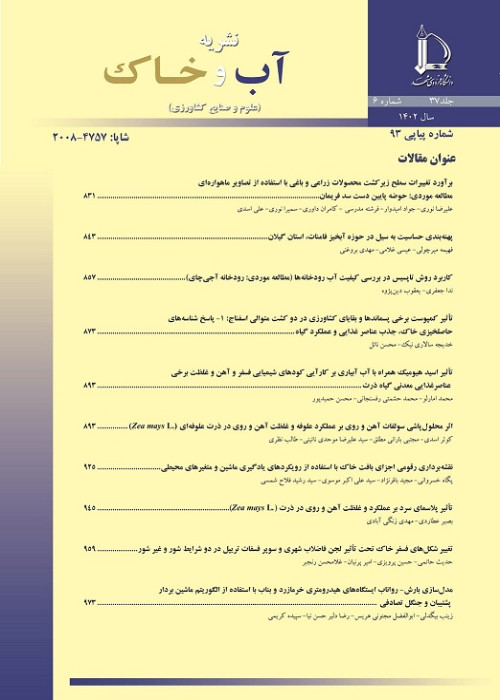Optimal Waste Load Allocation Using Multi-Objective Optimization and Multi-Criteria Decision Analysis
Author(s):
Abstract:
Introduction
Increasing demand for water, depletion of resources of acceptable quality, and excessive water pollution due to agricultural and industrial developments has caused intensive social and environmental problems all over the world. Given the environmental importance of rivers, complexity and extent of pollution factors and physical, chemical and biological processes in these systems, optimal waste-load allocation in river systems has been given considerable attention in the literature in the past decades. The overall objective of planning and quality management of river systems is to develop and implement a coordinated set of strategies and policies to reduce or allocate of pollution entering the rivers so that the water quality matches by proposing environmental standards with an acceptable reliability. In such matters, often there are several different decision makers with different utilities which lead to conflicts.Methods/Materials: In this research, a conflict resolution framework for optimal waste load allocation in river systems is proposed, considering the total treatment cost and the Biological Oxygen Demand (BOD) violation characteristics. There are two decision-makers inclusive waste load discharges coalition and environmentalists who have conflicting objectives. This framework consists of an embedded river water quality simulator, which simulates the transport process including reaction kinetics. The trade-off curve between objectives is obtained using the Multi-objective Particle Swarm Optimization Algorithm which these objectives are minimization of the total cost of treatment and penalties that must be paid by discharges and a violation of water quality standards considering BOD parameter which is controlled by environmentalists. Thus, the basic policy of rivers water quality management is formulated in such a way that the decision-makers are ensured their benefits will be provided as far as possible. By using MOPSO, five alternatives and their performances under criteria are found. Values that are calculated by MOPSO are applied to form the cardinal Multi-Criteria Decision Making (MCDM) matrix. Afterwards, the cardinal MCDM matrix is transformed into the ordinal form. For studying competitive behaviors in such situations, a mathematical tool called game theory is used. Hence the transition matrix is formed for solving the problem by game theory and qualitative data. Finally the best non-dominated solution is defined using the Nash conflict resolution theory.
Results And Discussion
The interaction point of the Sefidrood River and Caspian Sea is considered as a checkpoint and the standard amount of BOD considering the Iranian Protection Agencys standards is equivalent to 5 mg/l. In the studied area, none of waste load dischargers perform current wastewater treatment. Under this circumstance, the BOD has the value of 26.59 mg/l which violated its standard amount. By MOPSO algorithm and Nash theory five alternatives, which each of them includes both the amount of BOD in checkpoint and treatment and penalty total cost, are obtained for two decision makers. The best and final alternative, that is preferred by both of decision-makers, reduces the BOD amount and the total payable cost to 6.16 mg/l and 296,293 $/year respectively.Conclusion
The practical utility of the proposed model in decision-making is illustrated through a realistic example of the Sefidrood River in the northern part of Iran. As a final alternative, that suggests the most economical measurement by minimizing of treatment and penalty total cost, there are acceptable percentage of treatment per discharge and the violation of standard for BOD parameter is negligible.Keywords:
Language:
Persian
Published:
Journal of water and soil, Volume:30 Issue: 1, 2016
Pages:
88 to 98
magiran.com/p1552418
دانلود و مطالعه متن این مقاله با یکی از روشهای زیر امکان پذیر است:
اشتراک شخصی
با عضویت و پرداخت آنلاین حق اشتراک یکساله به مبلغ 1,390,000ريال میتوانید 70 عنوان مطلب دانلود کنید!
اشتراک سازمانی
به کتابخانه دانشگاه یا محل کار خود پیشنهاد کنید تا اشتراک سازمانی این پایگاه را برای دسترسی نامحدود همه کاربران به متن مطالب تهیه نمایند!
توجه!
- حق عضویت دریافتی صرف حمایت از نشریات عضو و نگهداری، تکمیل و توسعه مگیران میشود.
- پرداخت حق اشتراک و دانلود مقالات اجازه بازنشر آن در سایر رسانههای چاپی و دیجیتال را به کاربر نمیدهد.
In order to view content subscription is required
Personal subscription
Subscribe magiran.com for 70 € euros via PayPal and download 70 articles during a year.
Organization subscription
Please contact us to subscribe your university or library for unlimited access!


